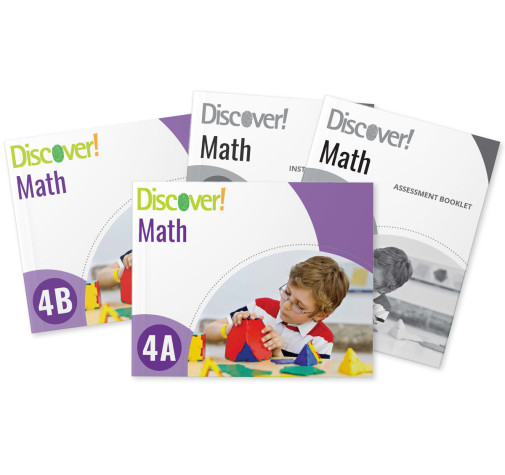We use cookies to make your experience better. To comply with the new e-Privacy directive, we need to ask for your consent to set the cookies. Learn more.
Discover! Math 4th Grade Set
Set includes Instructor Guide, Student Worktext 4A, and Student Worktext 4B. The instructor guide is easy to follow with lots of support for the teacher. Also includes assessments and answers to the worktext. The colorful worktexts are consumable and engaging to the student with direct instruction using real life scenarios and varied activities.
Instructor Guide
Very straightforward and easy-to-use, this instructor guide complements the student worktext and includes tips and suggestions to support the student’s learning. Additional activity suggestions are included for different learning styles or to extend the learning. Assessments are available in two different formats for each chapter – written or project based. A rubric is included for project-based assessments. Answers to the student workbook are included in the instructor guide. Blackline masters of math templates, models, charts, and references for parents to use throughout the course are in the back of the guide. This program uses basic elementary math manipulatives or household items.
4A Student Worktext
A full-color consumable worktext for first semester, this book uses engaging real life scenarios and stories, direct instruction, and pictorial examples to teach math concepts. Lots of hands-on activities are included. Review is included at the end of each chapter. Topics are introduced sequentially and cover place value, addition, subtraction, multiplication, perimeter and area, and division.
4B Student Worktext
A full-color consumable worktext for second semester, this book uses engaging real life scenarios and stories, direct instruction, and pictorial examples to teach math concepts. Lots of hands-on activities are included. Review is included at the end of each chapter. Topics are introduced sequentially and cover fractions, decimals, measurement, data, points, lines and angles, plane and solid figures.
The instructor guide takes the guesswork out of lesson planning by providing helpful suggestions and answer keys for all activities and assessments.
Student worktext includes activities, instruction, and extensions to appeal to all learning styles. Daily lessons reinforce and grow addition, subtraction, place value, multiplication, division, perimeter, and area skills in student worktext A. The lessons in student worktext B focus on expressions, equations area, surface area, volume, statistics, and probability.
The assessment booklet allows students to grow as an independent learner. This booklet provides chapter assessments, covering 5-10 lessons worth of material and rubrics that guide students through the assessments.
This package includes Discover! Math Grade 4 Student Worktext A, Student Worktext B, the Instructor Guide, and the Assessment Booklet.
Catering to a wide range of students by integrating activities for a variety of learning styles, Discover! Math has a good mix of problems and activity-based exercises using various activities like graphic organizers, matching, drawing, and other hands-on applications. Correlating with national standards, each lesson presents an engaging storyline, direct instruction with pictorial examples, written practice, and several other activities. Algebraic concepts are introduced in the earlier grades to develop a more conceptual understanding of math. Each lesson is around 8-10 pages and usually takes 2-3 days to complete. Different math manipulatives or household items are suggested in the lessons for games or to enhance learning. Reviews are at the end of each chapter in the student book. Assessments are included in the teacher book or the Assessment Book and offer two different options, written or project based – a nice option for different learners. Answers and Grading Rubrics are included in the Instructor Guide.
Each package includes an Instructor Guide, Student A Workbook for first semester, Student B Workbook for second semester, and the Assessment Book. Currently these are only sold as a set, and are not available individually.
The Instructor Guide is a useful asset to the parent and complements the worktext. Instructions are easy to follow. Each lesson begins by listing the lesson objectives then moves directly into the teaching. Grades one and two include both italicized scripted text (telling the parent exactly what to say) and standard text (tips for implementing the lesson). Grades three and up no longer include the scripted text but still have plenty of tips and support for each section in the student book. Every lesson also includes activity suggestions for different learning styles, booster, as well as extension activities. Some lessons also have suggested co-op activities. Answers to the student workbook are at the end of each lesson in the instructor guide. The back of the guide has blackline masters of math templates, models, charts, and references for parents to use throughout the course.
Consumable Student Workbooks are in full-color and begin with lesson objectives, lesson review (if needed), and introduce any vocabulary such as number line, data, graph, etc. Next are the Explore, Read, and Practice sections. Students read real life examples or stories, direct instruction is provided, and pictorial examples are shown. Practice problems allow students to apply what they have learned. The Skill Builder and Show What You Know sections build on previous skills and provide more review and practice. Sharpen Your Skills practice math facts either using digital or physical flashcards. Other suggested play or project activities vary per lesson.
If you love Singapore and Montessori math philosophies, take a look at this program. Using a scaffolding approach, it focuses on manipulatives and concrete elements in the earliest stages of development and moves into pictorial and abstract learning as student’s progress. The stories are relatable to the students as they solve real life math problems. ~ Gina
| Product Format: | Other |
|---|---|
| Brand: | Discover! |
| Grade: | 4 |

